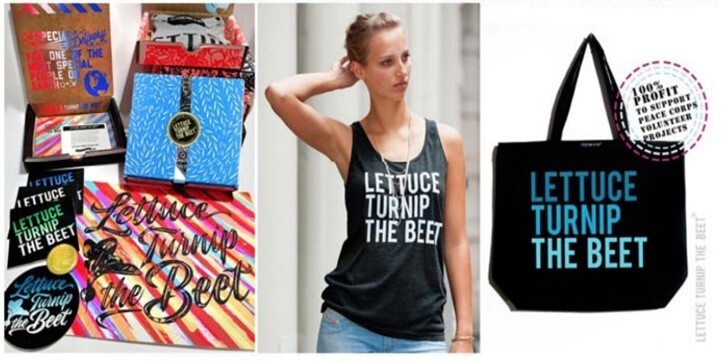Pun Intended, but Not Infringing: 9th Circuit Finds LETTUCE TURNIP THE BEET Aesthetically Functional
March 2, 2021
Authored and Edited by Morgan E. Smith; Margaret A. Esquenet
LTTB, LLC is a small business that has seen success due to its vegetable-based pun LETTUCE TURNIP THE BEET. LTTB owns four trademark registrations for the pun for various apparel products, tote bags, and online retail store services, among other things. Many of LTTB’s products are emblazoned with the phrase:

LTTB brought suit in the Northern District of California against Redbubble, Inc. in January 2018 for counterfeiting, trademark infringement, unfair competition, and false designation of origin. Redbubble is an online marketplace where independent artists can upload and sell their designs on everyday products such as apparel, tote bags, stickers, etc. Some of the designs available on Redbubble’s website include LETTUCE TURNIP THE BEET:


In July 2019, the district court granted Redbubble’s motion for summary judgment, finding that, under the doctrine of aesthetic functionality, LTTB could not prevent others from displaying the LETTUCE TURNIP THE BEET pun on products. LTTB “[was] not entitled to pre-empt use of the pun under the guise of trademark law.” LTTB, LLC v. Redbubble, Inc., 385 F. Supp. 3d 916, 918 (N.D. Cal. 2019). The district court, however, was careful to note that its ruling did not mean that LTTB has no viable trademark rights, just that LTTB cannot “preclude others from displaying the pun on products, absent a showing of source-confusion.” Id. at 922. The Ninth Circuit upheld the ruling, concluding that LTTB “failed to raise a triable issue that its marks serve the trademark function . . . .” LTTB, LLC v. Redbubble, Inc., No. 19-16464, 2021 WL 195024, at *1 (9th Cir. Jan. 20, 2021).
The doctrine of aesthetic functionality has its roots in a comment in the 1938 Restatement of Torts: “When goods are bought largely for their aesthetic value, their features may be functional because they definitely contribute to that value and thus aid the performance of an object for which the goods are intended.” The doctrine has since evolved to both deny trademark protection to design features which are included to make a product more aesthetically pleasing or commercially desirable and foreclose liability for infringement for uses of designs that are merely aesthetically functional and not source identifying.
The test for aesthetic functionality has two steps, as articulated in Au-Tomotive Gold, Inc. v. Volkswagen of Am., Inc., 457 F.3d 1062 (9th Cir. 2006). The first step requires analysis as to whether the alleged non-trademark function is essential to the use or purpose of the item or affects its cost or quality. The second step analyzes whether protection of the feature would put competitors at a significant non-reputation-related disadvantage. In this case, however, the district court relied on a slightly different version of the test articulated in International Order of Job’s Daughters v. Lindeburg & Co., 633 F.2d 912 (9th Cir. 1980).
The Ninth Circuit affirmed the district court’s findings that the LETTUCE TURNIP THE BEET pun was aesthetically functional. First, it held that the district court did not erroneously rely on the test for aesthetic functionality articulated in Job’s Daughters because the case remains good law and the result would be the same under the test as articulated in Au-Tomotive Gold. T-shirts would still function as t-shirts without the marks, use of the marks did not alter the cost structure or add to the quality of the products, and exclusive use of the marks would put competitors at a significant non-reputation-related disadvantage.
In short, LTTB presented no evidence that consumers buy its punny t-shirts because the t-shirts identify LTTB as the source, as opposed to because the consumers enjoy the aesthetic function of the pun.
The Ninth Circuit also held that, given the district court’s findings regarding functionality, the district court did not err in (1) failing to address uses of the marks on Redbubble’s website and in online advertising and (2) the issue of likelihood of confusion. The Court also rejected LTTB’s arguments that the district court improperly ignored LTTB’s design marks and improperly relied on the USPTO’s initial rejection of one of LTTB’s trademark application as decorative or ornamental (the application was ultimately approved once LTTB submitted examples of the mark on product hang tags as opposed to on the front of its shirts).
While infringement was not found in this case, it is clear from the district court’s ruling that aesthetic functionality is not an impermeable shield. Placing a mark on a t-shirt, tote bag, or mug is not an automatic defense:
. . . [C]ompanies that have already established [a] famous mark for selling a product—for instance Coca-Cola, Volkswagen, Audi, or Nike—may thereafter be able also to exploit consumer interest in the mark by selling t-shirts or other products emblazoned with such marks, and preclude others from doing so
. . .
Redbubble instead appropriately frames the argument as precluding LTTB from showing a likelihood of confusion as to source, where the mere use of the pun on the face of various products cannot be source-identifying.
. . .
[N]othing in this ruling precludes LTTB from enforcing its rights against a defendant who markets a products [sic] misleadingly suggesting LTTB is the source.
LTTB, LLC, 385 F. Supp. 3d at 921-22.
The case is LTTB, LLC v. Redbubble, Inc., No. 19-16464, 2021 WL 195024, at *1 (9th Cir. Jan. 20, 2021).
Related Practices
Related Industries
Related Offices
Contacts
Copyright © 2021 Finnegan, Henderson, Farabow, Garrett & Dunner, LLP.
DISCLAIMER: Although we wish to hear from you, information exchanged in this blog cannot and does not create an attorney-client relationship. Please do not post any information that you consider to be personal or confidential. If you wish for Finnegan, Henderson, Farabow, Garrett & Dunner, LLP to consider representing you, in order to establish an attorney-client relationship you must first enter a written representation agreement with Finnegan. Contact us for additional information. One of our lawyers will be happy to discuss the possibility of representation with you. Additional disclaimer information.




